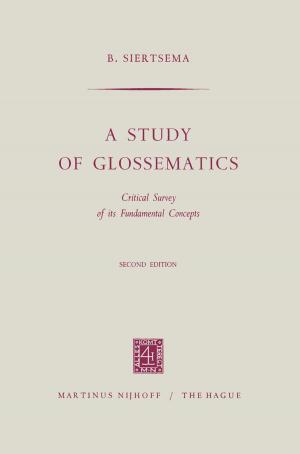The Ecology of Vertebrate Olfaction
Nonfiction, Science & Nature, Science, Biological Sciences, Ecology, Reference & Language, Education & Teaching| Author: | D. M. Stoddart | ISBN: | 9789400958692 |
| Publisher: | Springer Netherlands | Publication: | December 6, 2012 |
| Imprint: | Springer | Language: | English |
| Author: | D. M. Stoddart |
| ISBN: | 9789400958692 |
| Publisher: | Springer Netherlands |
| Publication: | December 6, 2012 |
| Imprint: | Springer |
| Language: | English |
Scientists not infrequently succumb to the frustration they feel when they have to garner often quite fundamental information about an undeveloped field from scattered publications covering many disciplines by writing their own review of the field in question. This is an invaluable exercise, particularly for those in the business of stimulating students to grapple with unfamiliar ideas and concepts, since it makes the introduction to that literature much less painful. To some extent I, too, have succumbed to this frustration by writing this book, but I have also, much more importantly, tried to develop out of this literature an olfactory perspective of the whole organism in its environment - in its feeding relations, reproductive biology, ecological isolation, social organization, ability to give warning and defend itself, and ability to navigate when displaced from home. One event more than any other acted as a catalyst to encourage me to start this task. One evening in the arid Australian bush, as I was returning to camp, the stirring of the air bathed me in a host of smells I had been unaware of in the stifling heat of the day. I found their effect on me quite extraordinary, for they refreshed and revitalized me more than I would ever have imagined possible. I had a rare glimpse of what it must be like to be macrosmatic-to rely on one's nose for one's sensory input.
Scientists not infrequently succumb to the frustration they feel when they have to garner often quite fundamental information about an undeveloped field from scattered publications covering many disciplines by writing their own review of the field in question. This is an invaluable exercise, particularly for those in the business of stimulating students to grapple with unfamiliar ideas and concepts, since it makes the introduction to that literature much less painful. To some extent I, too, have succumbed to this frustration by writing this book, but I have also, much more importantly, tried to develop out of this literature an olfactory perspective of the whole organism in its environment - in its feeding relations, reproductive biology, ecological isolation, social organization, ability to give warning and defend itself, and ability to navigate when displaced from home. One event more than any other acted as a catalyst to encourage me to start this task. One evening in the arid Australian bush, as I was returning to camp, the stirring of the air bathed me in a host of smells I had been unaware of in the stifling heat of the day. I found their effect on me quite extraordinary, for they refreshed and revitalized me more than I would ever have imagined possible. I had a rare glimpse of what it must be like to be macrosmatic-to rely on one's nose for one's sensory input.















